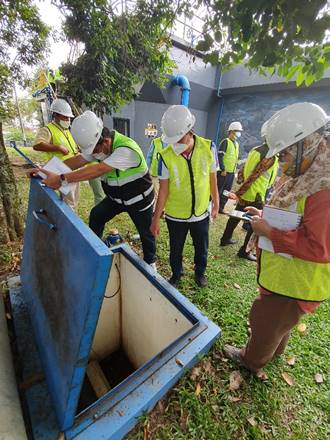Meet Nur 'Aisyah Nasution, a young woman who played an important role in managing portfolio and the national agenda to achieve access to safe drinking water and sanitation in Indonesia. ‘Aisyah has a noble hope that all Indonesians will get access to safe drinking water through national policies and programmes in the field of drinking water and sanitation that she has coordinated since 2007.
"Contaminated drinking water can be bad for the community. And the most affected communities are people in vulnerable social and economic condition, and lower education," said ‘Aisyah.

Fig. 1: 'Aisyah during a field trip to a drinking water supply facility. Credit: Itsnaeni Abbas/WHO Indonesia
As Coordinator of Drinking Water and Sanitation in the Directorate of Housing and Settlements, Indonesian Ministry of National Development Planning/Bappenas, ‘Aisyah is heavily involved in the preparation of policies and provides input for planning in the field of drinking water and sanitation, which is in line with the mandate of SDGs.
According to 'Aisyah, the issue of access to safe drinking water needs to continue to be echoed, both at the national and sub-national levels. One of the reasons is that access to safe drinking water is one of the essential services that need to be met to realise the idea of Indonesia becoming one of the largest economy developing countries by 2045. In addition, to maintain and improve public health, it is essential to provide access to safe drinking water. For example, access to safe drinking water is one form of intervention to combat stunting, one of Indonesia’s priority health issues. In addition, during the COVID-19 pandemic, the availability of safe drinking water is essential for handwashing using soap, environmental cleaning, and disinfection efforts at home, in health service facilities and in public places.

Pic 2: Knowing the problems directly in the field can help the formation of policies that suit people’s needs./ Credit: Gary Adam/Bappenas
One of the efforts to improve safe drinking water services is implementing the Drinking Water Safety Plans (RPAM) that were introduced by WHO. "Together with other Ministries, I participated in ensuring the programme towards safe drinking water became a priority in the National Mid-term Development Plan, national road map, and regional budget planning agenda. So that the target of “100% Access to Safe Drinking Water in 2030 will be achieved," said ‘Aisyah.
‘Aisyah realises that there are still many residents in remote areas who do not have access to proper and safe drinking water; women and children are often the ones who are responsible for fetching drinking water for the household. They have to walk on foot from home often and carry the water from the source to their home. This condition is one of the encouragements for ‘Aisyah to continue developing programmes and activities related to providing access to safe drinking water by applying the principle of gender mainstreaming to improve and equalise welfare for women and children in Indonesia.

Credit: Photo Instagram Nur ‘Aisyah Nasution
Nevertheless, as a planner at the national level, ‘Aisyah still encounters challenges of developing gender-responsive and implementable policies and actions. "The mainstreaming of gender equality, disability and social inclusion in drinking water and sanitation programmes needs to be encouraged”, ‘Aisyah said. Indonesia still needs time and experience to implement gender-responsive programmes and policies. ‘Aisyah believes that she and her colleagues who have concerns about gender-friendly policies need to continue encouraging and motivating all parties at all levels of government. Furthermore, the policies are expected to inspire and motivate individuals to be proactive in applying the principles of inclusiveness and gender equality in shaping policies and implementing various programmes and activities in the field.
***
